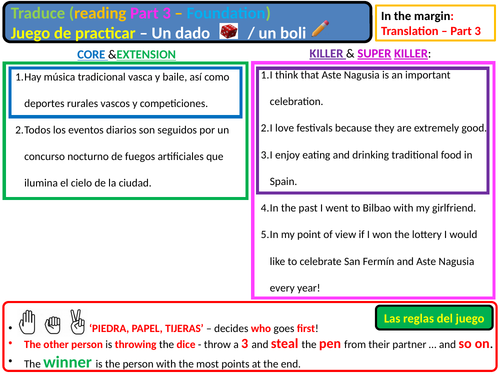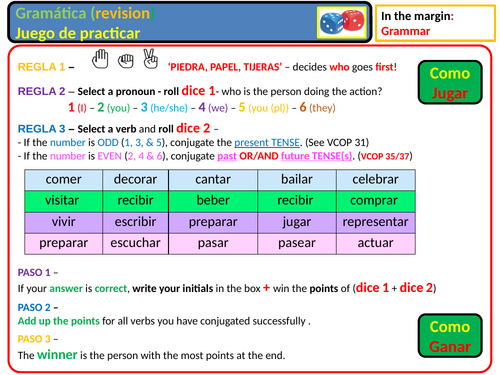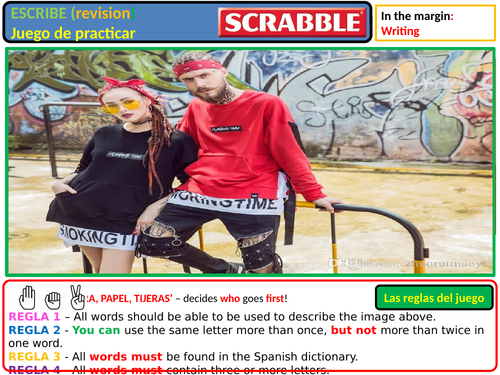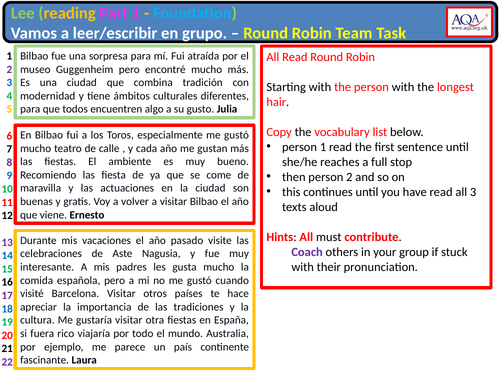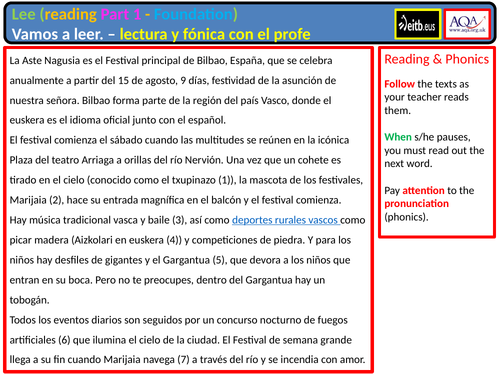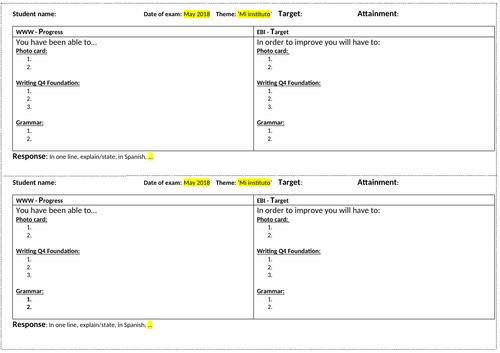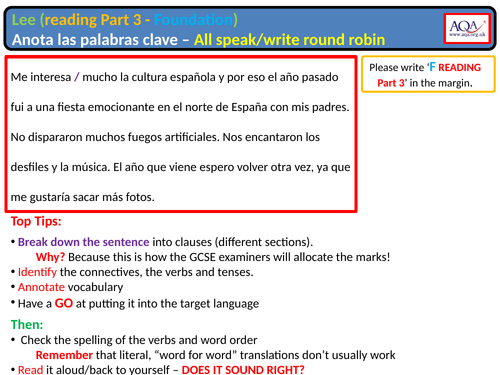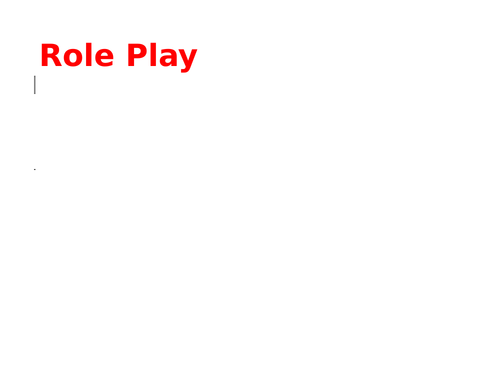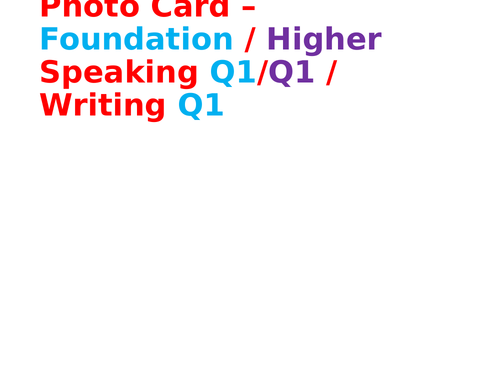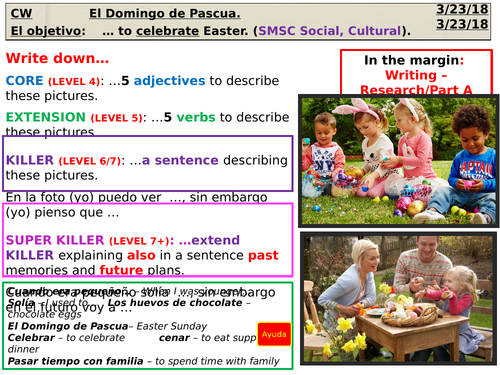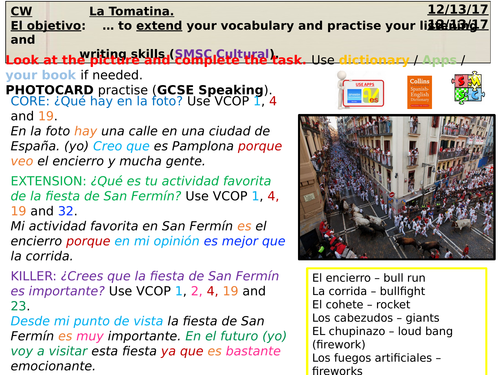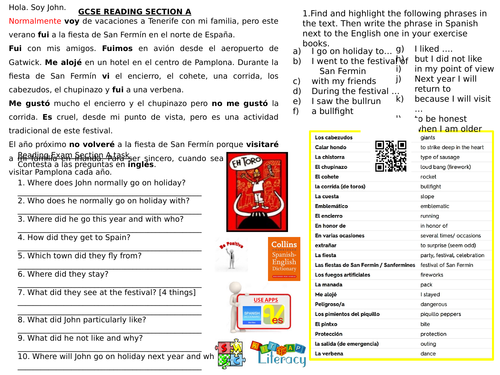
121Uploads
36k+Views
5k+Downloads
Languages
Bundle

AQA GCSE Spanish - Reading (A, B, C), Writing (1-4 aka Speaking Conversation) and Speaking (Photo card and Role Play) (Foundation/Higher) answer strategies
These are the templates that I prepared for my higher year 8 Spanish students and early KS4 in relation to answering Reading (A, B, C), Writing (1-4 aka Speaking Conversation) and Speaking (Photo card and Role Play).
They include different sets of reading activities and games to answer the questions of the AQA GCSE exam. The tasks are set for my Foundation tier but might as well work for Higher if mildly redacted.
Please let me know how it goes!
Bundle

Spanish Grammar / Vocabulary Games KS3/KS4/GCSE - Foundation and Higher
This is a collection of grammar games that I decided to share. I would use them for pretty much all age groups, both KS3 and KS4, GCSE both tiers. They can be easily amended to suit the grammar topics that you wish to reinforce / revise / introduce. The templates can also be easily reused for French.
See enclosed:
Snakes and ladders slide (you can amend the squares and it is short enough to serve as a 5-10 minutes activity;
Tarsia slide and template - an activity to use to revise topic / key vocabulary. Students can either create their own or just cut the one you prepare for them. They need to then match the words / expressions in English with their Spanish equivalents.
The dice game to revise verbs conjugations (differentiated). I included a slide with rules of the game, a template to create your own and an origami instructions to make it more hands on.
Photo card scrabble (related to AQA GCSE speaking / writing tasks). I originally thought of this as a game prior to completing an exam task for KS4 students. The pack includes a slide and a scrabble board if you wish to organise an extended activity. Students need to come up with words related to the image, the words should contain 3 or more letters and they should be in Spanish!
Dice conjugation (differentiated) - I would mostly suggest it for KS4 students as it is easier to differentiate. Students have a board with verbs and they need to roll dices to ascertain the personal pronoun that they apply to the infinitive on the board. My students totally loved it!
One dice, one pen (un dado, un boli) - (differentiated, AQA Reading Section C / Writing Part 3 Higher / Foundation) - Students roll dice in turns to translate the sentence correctly! If the partner throws 3 he takes over a pen. The winner is the one who collected the most points. I used it with KS4 to facilitate the exam translation tasks. I also included a set of slides that I used to emphasize certain grammar points.
Let me know how it goes!

Spanish Translation game (AQA GCSE Reading Part C / Writing Section 3)
One of my KS4 students favourite games!
One dice, one pen (un dado, un boli) - (differentiated, AQA Reading Section C / Writing Part 3 Higher / Foundation) - Students roll dice in turns to translate the sentence correctly! If the partner throws 3 he takes over a pen. The winner is the one who collected the most points. I used it with KS4 to facilitate the exam translation tasks.
I also included a set of slides that I used to emphasize certain grammar points.
Let me know how it goes!

Spanish Verb conjugation games (AQA GCSE/KS3)
This is a collection of verb conjugation games that I decided to share. I would use them for pretty much all age groups, both KS3 and KS4, GCSE both tiers. They can be easily amended to suit the grammar topics that you wish to reinforce / revise / introduce. The templates can also be easily reused for French.
See enclosed:
Snakes and ladders slide (you can amend the squares and it is short enough to serve as a 5-10 minutes activity;
The dice game to revise verbs conjugations (differentiated). I included a slide with rules of the game, a template to create your own and an origami instructions to make it more hands on.
Dice conjugation (differentiated) - I would mostly suggest it for KS4 students as it is easier to differentiate. Students have a board with verbs and they need to roll dices to ascertain the personal pronoun that they apply to the infinitive on the board. My students totally loved it!
Let me know how it goes!

AQA GCSE Photo card scrabble / Tarsia games with templates (speaking / writing /revision)
These are two grammar games that I decided to share. I would use them for pretty much all age groups, both KS3 and KS4, GCSE both tiers. They can be easily amended to suit the grammar topics that you wish to reinforce / revise / introduce. The templates can also be easily reused for French.
See enclosed:
Photo card scrabble (related to AQA GCSE speaking / writing tasks). I originally thought of this as a game prior to completing an exam task for KS4 students. The pack includes a slide and a scrabble board if you wish to organise an extended activity. Students need to come up with words related to the image, the words should contain 3 or more letters and they should be in Spanish!
Tarsia slide and template - an activity to use to revise topic / key vocabulary. Students can either create their own or just cut the one you prepare for them. They need to then match the words / expressions in English with their Spanish equivalents.
Let me know how it goes!
Bundle

AQA GCSE Spanish - Reading Sections A, B, C (Foundation) answer strategy
These are the templates that I prepared for my higher year 8 Spanish students and early KS4 in relation to answering Reading Foundation Sections A, B and C. They include different sets of reading activities and games to answer the questions of the Reading AQA exam. The tasks are set for my Foundation tier but might as well work for Higher if mildly redacted.
Please let me know how it goes!

AQA GCSE Spanish - Reading Section B (Foundation) answer strategy / Aste Nagusia
This is a template of a set of activities that I prepared for my higher year 8 Spanish students and early KS4 in relation to answering a Reading Section B Foundation task (questions and answers in Spanish) with elements of Part A to explain the main concepts.
Please note that this is a template and can be reused for different topics. This one is related to the topic of festivals and celebrations. It is based on the texts about Aste Nagusia.
The students read the texts aloud (Oracy!) in turns as a class and then play an ‘air writing’ game which basically means they are trying to locate the words that the teacher asks them to find. Next they do a similar task, trying to answer in Spanish in which line is the word the teacher asked them to locate. Next they annotate keywords in groups trying to translate as many unknown words as possible (in a group - coaching each other). They then play a quick tenses game to revise how to identify present, past, immediate future and conditional verbs and how to correctly translate them into English.
Consequently they revise the strategies for approaching Reading Part A/B tasks and play a quick translation game. I then thought it would be useful if they quickly revise the Spanish question words by playing an online game (from the Language Gym website - free and useful!) and complete the Reading Part B task (differentiated).
Please let me know if there are any problems / ideas!

AQA GCSE Spanish - Reading Section A (Foundation) answer strategy / Aste Nagusia
This is a template of a set of activities that I prepared for my higher year 8 Spanish students and early KS4 in relation to answering a Reading Section A Foundation task (answers in English).
Please note that this is a template and can be reused for different topics. This one is related to the topic of festivals and celebrations. It is based on a text about Aste Nagusia from the official governmental website so the text is just mildly redacted to suit the level of the readers. See the link embedded in the image in the first slide.
The students read the text aloud (Oracy!) in turns as a class and then again in groups. Then they use their knowledge, dictionary / Apps to locate the meaning of unknown keywords and look at the pictures for these keywords. Then they play team challenge game to find the meaning of the Spanish verbs that appear in the text and check their answers. Next is the reading of the unrelated literary text in English in groups to exemplify that the meaning of the words in read (with jumbled letters) does not actually stop them from understanding the text.
Consequently they revise the strategies for approaching Part A tasks, play a quick translation game and complete the tasks (differentiated).
Please let me know if there are any problems / ideas!

AQA GCSE Spanish / French / KS4 / KS3 Assessment e-Feedback - blank template
Assessment e-Feedback - blank template if anyone finds it useful. I used for Spanish GCSE classes but it can be adapted for French or KS3. Have a look and let me know what you think!

AQA GCSE Spanish - Reading Section C - SP-ENG translation (Foundation) answer strategy
This is a template of a set of activities that I prepared for my higher year 8 Spanish students and early KS4 in relation to answering a Reading Section C Foundation task (SP-ENG translation).
Please note that this is a template and can be reused for different topics. This one is related to the topic of festivals and celebrations.
First of all students discuss the task and top tips with each other (All speak / write round robin) and then move on with discussing separate phrases in terms of grammar. Then they use the help / hints to translate the text individually. Then they check the answers, discuss them with each other and self-peer assess their work.
Please let me know if there are any problems / ideas!

AQA GCSE Spanish - Role Play answer strategy
This is a template that I prepared for my higher year 8 Spanish students and early KS4 in relation to answering a Speaking Role Play task. Please note that this is a template and can be reused for different topics.
It starts with a Quizlet slide to revise (whilst being engaged!) some vocabulary prior to looking at the task. There are various Quizlet word lists available so you can just change the QR code and link if another list of words is needed. Then Students together with the teacher discuss the strategies and look at the task, success criteria and marking scheme and revise question words and how to form different types of questions in Spanish. They check their knowledge of the latter by way of completing a quick test and check their answers / discuss mistakes. They then jot their thoughts on a similar Role Play task in pairs (using grammar help - note: we use VCOP mat so if you have one you will need to change the numbers of the grammar points, if not you nees to delete few bits, the examples of structures are provided anyway) and complete in in writing individually . Then their ‘Time Pair Share’ the Role Play and self/peer -assess their work.
Please let me know if there are any problems / ideas!

AQA GCSE Spanish - Speaking / Writing (Foundation) Photo card answer strategy
This is a template that I prepared for my higher year 8 Spanish students and early KS4 in relation to answering a Speaking Photo card task which can also be used for explaining how to complete Writing Foundation Question 1. Please note that this is a template and can be reused for different topics.
It starts with a Quizlet slide to revise (whilst being engaged!) some vocabulary prior to looking at the task. There are various Quizlet word lists available so you can just change the QR code and link if another list of words is needed. Then Students together with the teacher discuss the strategies and look at the task, success criteria and marking scheme and jot their thoughts in relation to a given Photo Card. They then play a catchphrase game in teams to reveal the phrase hidden behind (NOTE: when replacing the top centre image copy the animation from on of the coloured boxes around (Animation tab, animation painter), so that when you click on the image it does disappear similar to the coloured boxes around.)
Then they work in pairs to prepare a response to another (but similar!) photo card. Finally they do it individually and self/peer -assess their work.
Please let me know if there are any problems / ideas!
Bundle

AQA GCSE Spanish - Writing (Foundation) answer strategy
These are the templates that I prepared for my higher year 8 Spanish students and early KS4 in relation to answering Writing Foundation Questions 1-4. They include different games and tasks to revise verbs conjugations and vocabulary to answer the questions.
I also included the templates for some games and activities. These templates are totally amendable and adaptable to use with different topics and so far worked for my students.
Please let me know how it goes!

AQA GCSE Spanish - Writing (Foundation) answer strategy - Question 3
This is a template that I prepared for my higher year 8 Spanish students and early KS4 in relation to answering a Writing Foundation Question 3. Please note that this is a template and can be reused for different topics. This one is related to the topic of free-time / holiday activities.
Students begin by discussing the strategies and looking at the success criteria and marking scheme together with the teacher. They also revise some basic grammar rules (can be amended each time you do the task). They also look at the model answers and discuss usual mistakes and how to avoid / amend them. Then they play few verb conjugation games to revise some useful verbs. I included the snakes and ladders game as well as the dice game (see templates in the end of the presentation). They review their answers to the dice game using grammar rules and correct their answers. Consequently they work in pairs to prepare a response to another (but similar!) Question 3. Finally they do it individually and self/peer -assess their work.
Please let me know if there are any problems / ideas!

AQA GCSE Spanish - Writing (Foundation) answer strategy - Questions 2 and 4 / Higher Question 1
This is a template that I prepared for my higher year 8 Spanish students and early KS4 in relation to answering a Writing Foundation Questions 2 and 4 // Higher Tier Question 1. The topic of this example is celebrations / festivals.
Students begin by translating the short text into English and coaching each other if stuck at the same time assessing each other’s work. Then they revise some grammar by playing tarsia game (see template in the end of the presentation).
Consequently they get on with reading the question and what is required from them and discussing the what they could include in their answer (both content and grammar structures). Then they make a break and play a dice game (can be prepared prior to the lesson or during the same - see template in the end of the presentation) and a learning grid to revise verb tenses. They then get back to the task and work in pairs to plan their answers. Finally they complete the task individually, discuss the success criteria and the marking scheme with the teacher and peer / self assess their work.
Please let me know if there are any problems / ideas!

AQA GCSE Spanish - Writing (Foundation) answer strategy - Question 1
This is a template that I prepared for my higher year 8 Spanish students and early KS4 in relation to answering a Writing Foundation Question 1 (photo card).
Please note that this is a template and can be reused for different topics. This one is related to the topic of carnivals and celebrations.
It starts with a Quizlet slide to revise (whilst being engaged!) some vocabulary prior to looking at the task. There are various Quizlet word lists available so you can just change the QR code and link if another list of words is needed. Then Students together with the teacher discuss the strategies and look at the success criteria and marking scheme. Then they play few verb conjugation games to revise some useful verbs that they can use to describe the photo card later on in the lesson. Consequently they jot their thoughts on a different photo card (working in pairs / groups) and play a catchphrase game to get more ideas on the topic. Then they work in pairs to prepare a response to another (but similar!) photo card. Finally they do it individually and self/peer -assess their work.
Please let me know if there are any problems / ideas!
Bundle

Festivals and Celebrations bundle Cultural / SMSC
This bundle includes a collection of eight lessons created for few international celebrations such as Christmas and Easter as well as some traditional Spanish Festivals (e.g. Las Fallas, San Fermin, La Tomatina). I have tried to use some videos and games to make it more engaging whilst still providing students with some grammar / AQA GCSE exam practice. I also included the cultural starters I used as well as a template of my drill for teaching students how to answer AQA GCSE Reading parts A and B based on the text about Aste Nagusia, a Basque festival.

El Domingo de Pascua (SMSC - Cultural) Spanish (AQA) KS3/ KS4 lesson
This is an Easter lesson that I created for my higher KS3/KS4 Spanish students. The idea is to have some fun and to do some writing as well!
The lesson starts with a friendly - easy starter, lesson plan and pronunciation slide to learn how to pronounce some Easter related words. Then we move on to a quizlet task to learn / revise some Easter vocabulary and Rally Coach activity to check whether we remember the words (translation practice). I have then included a conjugation activity with some verbs (you need some dices!) followed by a competitive translation activity (make sure you have similar ability students working together). The students then use a trap door structure (table) to speak about their Easter day and then I tell them about my Easter day in a similar manner as suggested by previous activity. I first use pictures only and then show them the model answer and the grammar success criteria. After they write down their responses we move on to playing quizlet live and Hangman. Enjoy!

Spanish Festivals: La Tomatina - Spanish KS4 AQA Writing 3
This is the lesson that I have prepared for my y9/y10 in relation to the topic of Spanish culture (Festivals & Celebrations). The lesson starts with the starter about San Fermin Celebration (photo card style) (it was previous lesson title and I always try to link things together) and following review of lesson outcomes we move onto to trying to sing along with Enrique Iglesias (click on the 3d man for the youtube link or search for a YouTube video with lyrics). Students will then recap on SER conjugation in present tense and learn new / revise already known vocabulary on the topic of La Tomatina celebration using Quizlet and Quizlet live online tools. I have then included a video (see link) of Rosa from SpanishPod101 (see their channel in youtube) describing the celebration of La Tomatina. Even though the video is in Spanish and Rosa speaks really quickly, there are subtitles in English so that all students have a chance to listen to a native speaker and at the same time understand what the video is about (note: I personally find the Spanishpod101 videos amazing as they address quite a few cultural / grammar / pronunciation and other aspects so I would recommend letting your students know that a lot of resources are available for free. Consequently, students answer quiz questions about the video and move on to the grammar activity. They revise present tense and then analyse how to form 'Impersonal SE' structures. Then they do a quick test to check understanding and move on to a Writing Section 3 activity (translation from English into Spanish). They self-assess it and play Pictionary. Please note that there is also a handout to make the tasks easier and faster to access. Enjoy!

Spanish Festivals: San Fermin - Spanish KS4 AQA Reading A
This is the lesson that I have prepared for my y9/y10 in relation to the topic of Spanish culture (Festivals & Celebrations). The lesson starts with the starter about food (it was previous topic and I always try to link things together) and following review of lesson outcomes we move onto to trying to recite a tongue twister (plus a cultural SMSC tip!). Students will then recap on regular verbs conjugation in present tense and learn new / revise already known vocabulary on the topic of San Fermin celebration using Quizlet and Quizlet live tools. I have then included a video (see link) of Rosa from SpanishPod101 (see their channel in youtube) describing the celebration of San Fermin. Even though the video is in Spanish and Rosa speaks really quickly, there are subtitles in English so that all students have a chance to listen to a native speaker and at the same time understand what the video is about (note: I personally find the Spanishpod101 videos amazing as they address quite a few cultural / grammar / pronunciation and other aspects so I would recommend letting your students know that a lot of resources are available for free. Consequently, students answer quiz questions about the video and move on to Reading activity. They read the text aloud, search for cognates and keywords and finally answer the questions that I have tried to create in the style of AQA Higher Reading Section A. Please note that there is also a handout to make the task easier and faster to access. Enjoy!



